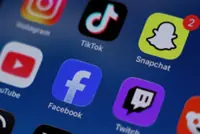The company, owned by Chinese tech-giant ByteDance, began testing the meditation exercises with select teens earlier this year and is now making the feature available to all users on its app. — AP
Have you, with the rest of the world, noticed how children, teens and young adults are addicted to TikTok?
Well, it seems TikTok has come up with a way for users to proficiently wean themselves off the app in order to get a good night’s sleep.
The social media sensation plans to do that by launching in-app guided meditation exercises, the platform announced last Thursday.
The company, owned by Chinese tech-giant ByteDance, began testing the meditation exercises with select teens earlier this year and is now making the feature available to all users on its app.
The premise of the feature is to help users improve their sleep quality and encourage them to put take a break from the app late at night, as opposed to scrolling endlessly while the night carries on.
Here’s how TikTok plans to implement the feature.
For teens under the age of 18, meditation will be turned on by default. If a teen is using the app after 10pm, their “For You” feed will be automatically interrupted by a guided meditation exercise that encourages users to wind down for the night.
The meditation feature displays a calming screen and mellow music accompanied with breathing exercises.
But many would ask what if teens ignored the feature?
If teens choose to ignore the message and continue to scroll through the app, a second full-screen prompt will urge them to go to sleep.
As for the adults who might be interested in the new feature, adults can turn it on by navigating the app’s Screen Time settings page. They would then toggle on the “sleep hours” feature. From there, choosing a time to start seeing the meditation exercise each night is available as well.
TikTok has been introducing new teen safety features in recent years due to concerns over the app’s impact on younger users. This newest feature is the company’s latest response to satisfy lawmakers.
One such suit from Attorney General Brian Schwalb of the District of Columbia accused TikTok of being intentionally addictive and psychologically damaging to kids, posing profound risks including depression, anxiety, sleep loss and body dysmorphia. – pennlive.com/Tribune News Service





